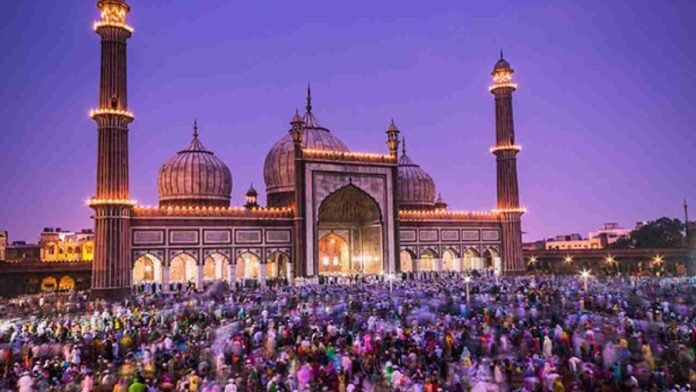As the crescent moon ushers in the joyous occasion of Eid-ul-Fitr, Muslims across India are embracing the festive spirit with fervor and enthusiasm. From bustling cities to remote villages, Eid festivities are in full swing, marking the end of Ramadan and the beginning of a day filled with prayers, feasting, and communal celebrations.
In cities like Mumbai, Delhi, and Kolkata, the streets come alive with vibrant colors and the sound of joyous greetings as Muslims gather in mosques and open spaces to offer special prayers known as Salat al-Eid. Clad in their finest attire, families exchange warm embraces and heartfelt wishes of “Eid Mubarak,” spreading love and goodwill among friends, neighbors, and strangers alike.
In Mumbai, the iconic Mohammed Ali Road transforms into a bustling hub of activity as people flock to its famous food stalls to indulge in traditional Eid delicacies such as biryani, kebabs, and sweet treats like sheer khurma. The aroma of spices fills the air, and the streets are adorned with twinkling lights, creating a festive ambiance that is unmatched.
Similarly, in Delhi’s Jama Masjid area, crowds gather in large numbers to offer prayers at the historic mosque and partake in the communal spirit of Eid. The area is abuzz with excitement as families gather for elaborate feasts and exchange gifts, reinforcing bonds of kinship and camaraderie.
In Kolkata, the festivities take on a unique flavor as the city’s iconic Nakhoda Masjid becomes the focal point of celebrations. Here, devotees gather to offer prayers and seek blessings for prosperity and peace. The nearby markets bustle with activity as people shop for new clothes, decorative items, and gifts to mark the auspicious occasion.
Even in rural areas and smaller towns, Eid is celebrated with equal fervor and devotion. Villages come alive with the sound of prayers and the laughter of children as families come together to share meals and exchange greetings. The spirit of unity and harmony prevails as people of all ages and backgrounds join hands in celebration.
In addition to the religious observances, Eid-ul-Fitr also serves as an occasion for acts of charity and compassion. Muslims are encouraged to extend a helping hand to those in need, ensuring that everyone can partake in the festivities and experience the joy of Eid.
As the day progresses, the festivities continue with lavish feasts and gatherings where friends and family members come together to share laughter, stories, and traditional dishes. From succulent kebabs to decadent desserts, the Eid feast is a feast for the senses, tantalizing taste buds and creating lasting memories.
In addition to the religious and communal aspects of Eid-ul-Fitr, the festival holds cultural significance as well. Across India, diverse traditions and customs are observed, reflecting the rich tapestry of the country’s Muslim heritage. From vibrant processions to lively music and dance performances, each region adds its own unique flavor to the celebrations, creating a mosaic of cultural expressions.
In Hyderabad, the historic Charminar becomes the centerpiece of Eid festivities, with thousands of people thronging to the iconic landmark to offer prayers and soak in the festive atmosphere. The city’s bustling markets overflow with shoppers, as families prepare for lavish feasts and exchange gifts to mark the occasion.
Similarly, in Lucknow, the Nawabi charm adds an elegant touch to Eid celebrations, with the city’s grand mosques serving as the backdrop for solemn prayers and heartfelt supplications. The streets are adorned with colorful decorations, and the aroma of traditional delicacies like kebabs, biryani, and sewaiyan fills the air, tempting passersby with their irresistible flavors.
In Kerala, Eid-ul-Fitr is celebrated with great gusto, with the state’s scenic backwaters providing a picturesque setting for the festivities. Families gather for special prayers at mosques and idgahs, followed by sumptuous feasts featuring local delicacies such as pathiri, biryani, and mutton curry. The spirit of communal harmony is evident as people of different faiths come together to share in the joy of Eid.
Eid-ul-Fitr is also a time for reflection and gratitude, as Muslims reflect on the spiritual growth and self-discipline attained during the holy month of Ramadan. It is a time to renew one’s commitment to faith, compassion, and service to humanity, embodying the principles of generosity and empathy espoused by Islam.
As the day draws to a close, the echoes of “Eid Mubarak” reverberate throughout the country, uniting people in a shared celebration of joy, peace, and brotherhood. The spirit of Eid transcends barriers of language, culture, and geography, bringing people together in a spirit of unity and solidarity.

